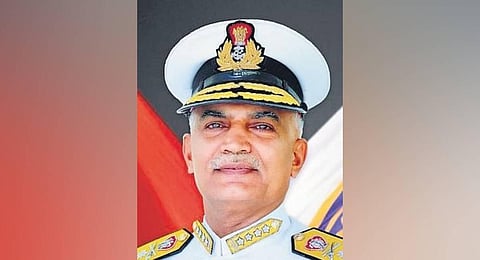

BENGALURU: The Indian Navy has kept a close watch on the just-concluded bilateral naval exercise - Sea Guardians-3 - by China’s People’s Liberation Army Navy (PLAN) and Pakistan navy in the northern Arabian Sea, Chief of the Naval Staff Admiral R Hari Kumar told TNIE on the sidelines of the ninth Synergia conclave in the city on Saturday.
Sea Guardians-3, which started at the Karachi Naval Dockyard on November 12, ended this week. The joint drill was also to safeguard the China-Pakistan Economic Corridor (CPEC), which is an important part of China’s proposed Belt and Road Initiative (BRI) and has been strongly opposed by India as it passes through Pakistan-occupied Kashmir (PoK) and is in violation of the country’s sovereignty.
On the role of the Indian Navy in the ongoing Israel-Gaza conflict, he said they are on standby in the Gulfs of Oman and Aden and the Red Sea for any humanitarian assistance, including evacuation.
On the use of technology and modernisation of the Navy, he said the Navy has set up an unmanned squadron in Karwar and a lot is happening on the unmanned aerial and maritime assets. Earlier addressing a session on ‘Indo-Pacific Challenges and Way Ahead’, he said the Indo-Pacific region centres around four parameters -- GIST (Geography, International Relations, Security, and Trade Relations). “The Indian Ocean is geographically the smallest, geologically the youngest, and geo-strategically, the most complex. The Pacific Ocean, on the other hand, is the largest, empty at its core, but with prominent fault lines,” he said.
“Due to the legal ownership of the unregulated territories, the oceans are treated as ‘global commons’, giving nations unfettered access to their resources,” said the naval chief.
He added that the Indo-Pacific region faces multiple challenges such as maritime terrorism, humanitarian crises, etc, that naval bodies like the Bhartiya Nau Sena (BNS/Indian navy) are addressing. But holistic maritime security cannot be achieved by the Indian Navy alone. “We are traversing through a contested present to an uncertain future. There is a need for cooperation and collaboration to find regional solutions for regional problems,” said Admiral Kumar.